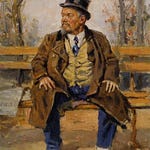Welcome to Sundays with Seneca on the Perennial Meditations podcast. Join the search for ancient lessons for modern life in the writing and Stoic philosophy of Lucius Annaeus Seneca.
On Groundless Fears
In a letter known today as On Groundless Fears, Seneca wrote,
I know that you have plenty of spirit; for even before you began to equip yourself with maxims which were wholesome and potent to overcome obstacles, you were taking pride in your contest with Fortune; and this is all the more true now that you have grappled with Fortune and tested your powers. For our powers can never inspire in us implicit faith in ourselves except when many difficulties have confronted us on this side and on that and have occasionally even come to close quarters with us. It is only in this way that the true spirit can be tested—the spirit that will never consent to come under the jurisdiction of things external to ourselves.
This is the touchstone of such a spirit; no prizefighter can go with high spirits into the strife if he has never been beaten black and blue; the only contestant who can confidently enter the lists is the man who has seen his own blood, who has felt his teeth rattle beneath his opponent’s fist, who has been tripped and felt the full force of his adversary’s charge, who has been downed in body but not in spirit, one who, as often as he falls, rises again with greater defiance than ever.
There are more things, Lucilius, likely to frighten us than there are to crush us; we suffer more often in imagination than in reality. I am not speaking with you in the Stoic strain but in my milder style. For it is our Stoic fashion to speak of all those things, which provoke cries and groans, as unimportant and beneath notice; but you and I must drop such great-sounding words, although, heaven knows, they are true enough. What I advise you to do is, not to be unhappy before the crisis comes; since it may be that the dangers before which you paled as if they were threatening you, will never come upon you; they certainly have not yet come.
Accordingly, some things torment us more than they ought; some torment us before they ought; and some torment us when they ought not to torment us at all. We are in the habit of exaggerating, or imagining, or anticipating, sorrow.
You may retort with the question: “How am I to know whether my sufferings are real or imaginary?” Here is the rule for such matters: we are tormented either by things present, or by things to come, or by both. As to things present, the decision is easy. Suppose that your person enjoys freedom and health, and that you do not suffer from any external injury. As to what may happen to it in the future, we shall see later on. Today there is nothing wrong with it.
“But,” you say, “something will happen to it.” First of all, consider whether your proofs of future trouble are sure. … Yes, my dear Lucilius; we agree too quickly with what people say. We do not put to the test those things which cause our fear; we do not examine into them; we retreat just like soldiers who are forced to abandon their camp because of a dust cloud raised by stampeding cattle, or are thrown into a panic by the spreading of some unauthenticated rumor. […]
Let us, then, look carefully into the matter. It is likely that some troubles will befall us; but it is not a present fact. How often has the unexpected happened! How often has the expected never come to pass! And even though it is ordained to be, what does it avail to run out to meet your suffering? You will suffer soon enough, when it arrives; so look forward meanwhile to better things. […]
—
Thank you for listening; I hope you found something useful.
Until next time, be wise and be well,














Seneca on Groundless Fears